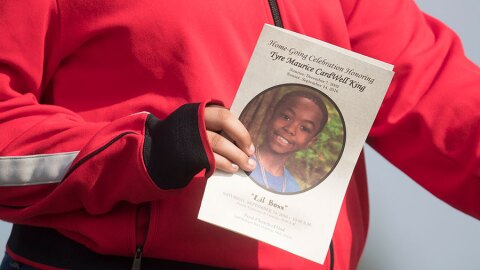At the first meeting of Akron City Council’s Reimagining Public Safety Committee, Akron Police Chief Kenneth Ball made a brief appearance to get things rolling.
“I would say that I’m thankful to be here, but I’m not. I’m frustrated,” Ball told members of council in September 2020.
He went on to say he didn’t believe his department needed to be reformed following the summer of nationwide protests after the death of George Floyd, and that council was ignoring all the good work his department already does.
“These knee-jerk reactions to something that happens in other parts of the country, it feeds the dissatisfaction that exists, not with all people either,” Ball said. “There is a very vocal minority that is putting this stuff out.”
Despite the chief’s forceful push back, Council President Margo Sommerville and other council members sought to keep the new committee’s process on track.
“This is not an attack but it’s an opportunity for us to work together, to see what is it that we are doing” Are there some things that we can do better? Can council be a better support to the Akron Police Department?” Sommerville said.
Two months later, Chief Ball announced his retirement.
And in January, Akron City Council released a series of recommended reforms.
The list called for a strengthened police auditor, for the department to share data on police stops and arrests. It recommended trying to involve more social workers on calls for service and more training for officers.
The next step is a series of community meetings to find out what residents want. Throughout April, Akron residents are being asked to participate in a series of small public meetings to hash out council’s recommendations and residents’ views on the city’s police department.
“Those recommendations are 10 years late,” said Raymond Greene, director of the Akron-based activist group Freedom BLOC. He’s been working on police reform in Akron for years. “And they're just recommendations, they're not actually policy or charter amendments. Which means now we've got another two years before we implement them.”
Greene plans to participate in the April community conversations. But his group has moved on to much deeper reforms. Freedom BLOC had already begun the work of recruiting and running candidates for boards, commissions and other decision-making bodies around the city.
“We have to be at the table in order to express our feelings, our disgruntledness, at the table.” Greene said. “But our ultimate goal has be to create a new system and that system can’t be with the current people that are already in the system.”
On police reform, Greene’s group supports defunding the police – moving money out of the department budget and into other investments, like economic development and social work.
Council’s recommendations go in the opposite direction, calling for additional investments in training and equipment for the police department.
Students and researchers at the University of Akron’s sociology department will run the community meetings. Sociology department chair Rebecca Erickson said the sessions will be very different from the typical public town hall meeting, starting by being limited to six to eight people.
“When you just walk around with the microphone, you get individual stories, but then it’s a one-off,” Erickson said. “They say it, and somebody notes it down, the reporter in the room will pick some set of those things to report on, but then the rest of it is lost to the ether.”
The plan is to produce a report for council that relies on data in the same way as a report in an academic journal would.
According to Erickson, Akron has some advantages that make hard reforms like these more possible.
First of all, its size – a little fewer than 200,000 residents, with about 500 uniformed police officers – offers some agility compared to bigger cities. Cleveland, for example, is nearly six years into a slow and difficult reform process under a consent decree with the U.S. Justice Department, has closer to 1,600 uniformed officers.
And then there’s the way Akron started its reforms.
“Clearly the death of George Floyd was the precipitating event,” Erickson said. “But that did not happen in Akron. We are not under a consent decree. This is an effort to have Akron improve as a community that is being generated by the members of that community.”
And starting with recommendations, as opposed to a consent decree’s requirements or new laws, can help keep the reform process from turning into one long fight, said Erickson.
Copyright 2021 90.3 WCPN ideastream. To see more, visit 90.3 WCPN ideastream.





